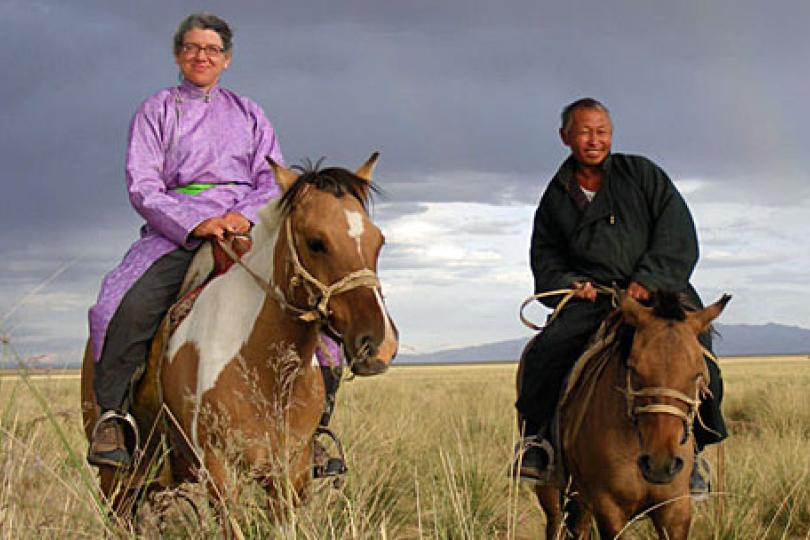Maria Fernández-Giménez: Research leads to Mongolia's highest honor
Editor's note: The following article first appeared on the Colorado State University website.
CSU Professor Maria Fernández-Giménez has received the Order of the Polar Star from the government of Mongolia, the highest civilian honor the country presents to foreign nationals.
Fernández-Giménez was selected due to her long-standing commitment to researching Mongolia’s extensive rangelands and how natural and human communities are adapting to ecological and economic change.
Fernández-Giménez has been researching rangeland systems and the pastoralists they support in Mongolia since the early 1990s, when she was among the first Western scientists to conduct research in Mongolia following the country’s transition from communism to a market-based economy. She joins the rarified air of previous recipients including former Secretary of State Hillary Clinton, and Sen. John McCain.
According to a decree from President Tsakhiagiin Elbegdorj, Fernández-Giménez received the honor due to her contributions to improving the knowledge of experts concerning animal husbandry in steppe regions, protection of natural resources and capacity-building.
“Receiving this award is a tremendous honor,” said Fernández-Giménez. “It means that the research and education we have done since 1993 is recognized and appreciated by the Mongolian government and the people of Mongolia. It also demonstrates the continuing importance of rangelands and pastoral livelihoods to the nation.”
“On a personal level, it is humbling and very meaningful to be nominated for this award by the people with whom I have worked so closely for so many years — Mongolian researchers, students and herders,” Fernández-Giménez added.
Rangelands support wildlife, people’s livelihoods
Mongolian rangelands, which make up three-quarters of the country, are critically important not only to people’s livelihoods, but also support globally important wildlife populations. The systems are sensitive to ecological change, including a rapidly warming climate, and those changes can have dramatic impacts throughout the country’s herding families.
Throughout her time in Mongolia she has focused on understanding ecological changes driven by livestock grazing and climate change, as well as herder livelihoods, management practices and policies that influence behaviors over time.
Since 2008, Fernández-Giménez has led the landmark Mongolian Rangelands and Resilience Project, or MOR2. MOR2 compares management practices of traditional herders with those of community resource groups that developed in the mid-2000s.
The team assessed Mongolian systems’ resilience to climate change, strengthened linkages between natural resource science and Mongolian policy makers, and built scientific capacity to analyze the dynamics of complex natural-human systems. Other CSU faculty involved in the effort include Professors Robin Reid, Steven Fassnacht and Melinda Laituri.
Better integration of social, ecological issues
Tungalag Ulambayar, a Mongolian national, earned her Ph.D. working on MOR2, and has seen firsthand the impacts the project has had on the nation. “We’ve learned the connections of social and ecological issues of rangeland systems,” she said. “Previously we were thinking of separate fields, and there was not integration. The project also brought forward the theoretical back-up of community–based rangeland management, and helped build a lot of confidence at different levels of MOR2 team members and partners.”
MOR2 involved dozens of Mongolian scientists, some of whom were fairly early in their careers. “We brought an interest in collaboration and science as a democratic process with us,” said Fernández-Giménez. “These were new concepts to many of our Mongolian colleagues who came from a much more hierarchal scientific background.”
Throughout MOR2 three Mongolian scientists, including Ulambayar, earned doctoral degrees at CSU, further increasing Mongolia’s scientific capacity. Their time studying on the main campus in Fort Collins provided great opportunities for further cultural exchange that, while challenging at times, was valuable, according to Fernández-Giménez. “The deep relationships that emerged between our group and collaborators in Mongolia facilitated an appreciation of different ways of knowing,” she said.
The project took place in communities throughout the country, creating unique logistical challenges. “We call it the Mongolian miracle,” said Fernández-Giménez. “We collected data throughout a developing country without strong infrastructure, and so many things could go wrong. But Mongolians never give up and they never say no. They figure out a way to get the job done.”
Outreach to impacted communities essential
Perhaps the strongest aspect of the project was the outreach back into communities where data collection took place. “We absolutely did not want to leave the communities we worked in out of the process after our field work was finished,” she explained. “The outreach components to the project were vital.”
Through regional workshops, the research team helped communities combine the scientific findings of MOR2 with their local knowledge, using scenarios to consider their futures and how to adapt to unpredictable environmental and economic changes.
Fernández-Giménez carried out high-level research meetings that included people from all aspects of the project, helping inform national policy direction and facilitate capacity-building. A radio call-in show hosted by Ulambayar sought to reach herders across the country.
“We’ve influenced the national dialog about policies related to rangelands and community-based management, in addition to the trajectory of how donors and non-governmental organizations are working and what they focus on,” Fernández-Giménez explained. “We have raised a great deal of awareness about rangelands’ importance, and what they mean to the country.”
Together with Robin Reid, director of CSU’s Center for Collaborative Conservation, and anthropology Professor Kathy Galvin, Fernández-Giménez is working to develop framework that calculates the conservation return on investment from community-based rangeland management, drawing on data from MOR2 and other datasets from Mongolia and the U.S.
Fernández-Giménez is a professor in the Department of Forest and Rangelands Stewardship in the Warner College of Natural Resources. The MOR2 project received funding from the National Science Foundation, the World Bank, USAID, the Ford Foundation, the Center for Collaborative Conservation and the American Center for Mongolian Studies.
